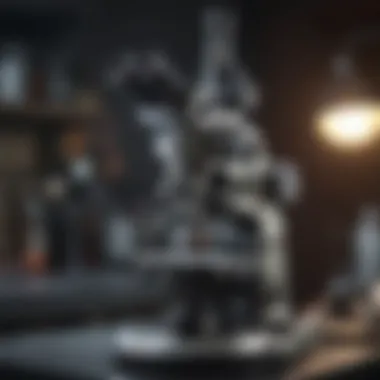Essential Qualifications for a Successful Lab Technician Career


Overview of the Topic
To embark on a career as a lab technician, a series of essential qualifications must be met. These qualifications encompass a blend of educational background, technical proficiency, and interpersonal skills vital for success in this role. By understanding the precise criteria sought by prospective employers, aspiring lab technicians can strategically position themselves for career advancement and excellence.
Introduction
In the realm of scientific investigation, the role of a lab technician stands as a crucial pillar of support, ensuring the smooth functioning of research laboratories and the validity of experimental outcomes. This article aims to dissect the essential qualifications indispensable for individuals aspiring to carve a career as lab technicians. By shedding light on the intricate web of educational prerequisites, technical proficiencies, and interpersonal skills, this piece serves as a compass guiding individuals towards a successful journey in the realm of laboratory sciences.
Defining the Role of a Lab Technician
In the ever-evolving landscape of scientific endeavors, lab technicians play a pivotal role in conducting various experiments, analyzing data, and maintaining the integrity of research procedures. Their responsibilities encompass a wide array of tasks, including operating laboratory equipment, documenting results, and adhering to stringent quality protocols. Lab technicians are the unsung heroes behind the scenes, ensuring that experiments are executed seamlessly and accurately, thereby enabling scientists to draw valid conclusions from their research efforts.
Significance of Qualifications
Qualifications serve as the bedrock upon which a successful career as a lab technician is built. These prerequisites are not mere formalities but rather the embodiment of the knowledge and skills essential for excelling in this role. Educational qualifications, technical competencies, and interpersonal aptitudes collectively form the foundation that sets apart an ordinary lab technician from an exceptional one. Employers seek candidates who not only meet the basic qualification criteria but also demonstrate a commitment to continuous learning and enhancement of their capabilities. Possessing the right qualifications not only enhances job prospects but also reflects a dedication to professionalism and excellence in the field of laboratory sciences.
Educational Requirements
Education holds a paramount significance in the realm of becoming a lab technician. It serves as the foundational pillar upon which an individual's skill set and competencies are built. The academic qualifications required for this role are rigorous, demanding candidates to possess a blend of theoretical knowledge and practical experience. Employers seek individuals with a strong educational background to ensure proficiency in laboratory procedures and protocols. Therefore, aspiring lab technicians must meet specific criteria to demonstrate their readiness to undertake the responsibilities associated with the position.


Bachelor's Degree in a Relevant Field
A Bachelor's degree in a relevant field is a fundamental requirement for individuals aspiring to forge a career as a lab technician. This degree equips candidates with the necessary theoretical knowledge and practical skills essential for operating efficiently in a laboratory setting. Pursuing a Bachelor's degree in a field such as biology, chemistry, or biotechnology provides students with a comprehensive understanding of scientific principles and laboratory techniques. Moreover, it cultivates critical thinking and problem-solving skills, preparing individuals to navigate the complexities of scientific experiments and analyses.
Specialized Certifications
In addition to a Bachelor's degree, obtaining specialized certifications further enhances a lab technician's qualifications. These certifications offer individuals the opportunity to gain expertise in specific areas of interest within the field. By completing specialized training programs and acquiring relevant certifications, lab technicians can demonstrate their commitment to continuous learning and professional development. Employers value candidates who exhibit a dedication to expanding their skill set and staying abreast of industry advancements through specialized certifications.
Continuing Education
Continuing education plays a vital role in the career progression of lab technicians. Staying updated on the latest advancements in laboratory technology, procedures, and methodologies is crucial for maintaining relevance in the field. Engaging in continuing education initiatives such as workshops, seminars, and online courses allows lab technicians to refine their skills and stay informed about emerging trends. By investing in lifelong learning, individuals can elevate their expertise, adapt to evolving industry standards, and position themselves as valuable assets within the laboratory setting.
Technical Skills
Technical skills play a vital role in the realm of lab technicians. This section focuses on the specific elements that are crucial for success in this field. Proficiency in laboratory techniques, instrumentation knowledge, and data analysis abilities are instrumental in ensuring accurate and reliable results in a laboratory setting. Employers typically seek candidates who possess a strong foundation in these technical skills to excel in their roles. Demonstrating competence in these areas not only enhances job performance but also opens up opportunities for career advancement. Lab technicians must continually hone their technical skills to stay abreast of technological advancements and industry best practices.
Laboratory Techniques Proficiency
Laboratory techniques proficiency is a cornerstone of success for lab technicians. This subsection delves into the significance of mastering various techniques such as sample preparation, testing procedures, and result interpretation. A deep understanding of these techniques is essential for conducting experiments accurately and drawing valid conclusions from test results. Lab technicians must exhibit precision and attention to detail in their work to ensure the reliability of data generated in the laboratory. Continuous practice and refinement of laboratory techniques are key to becoming a proficient lab technician.


Instrumentation Knowledge
Instrumentation knowledge is a pivotal component of a lab technician's skill set. This section explores the importance of understanding and operating a wide range of laboratory instruments and equipment. Proficiency in instrumentation is critical for performing tests effectively and efficiently, as modern laboratories rely heavily on sophisticated tools for analysis. Lab technicians with comprehensive instrumentation knowledge can enhance the quality and efficiency of laboratory procedures, contributing to accurate and timely results. Staying updated on the latest advancements in laboratory technology is essential for mastering instrumentation knowledge.
Data Analysis Abilities
Data analysis abilities are indispensable for lab technicians to extract meaningful insights from experimental data. This segment emphasizes the significance of interpreting data accurately, identifying trends, and drawing valid conclusions. Lab technicians must possess strong analytical skills to scrutinize complex datasets and report findings effectively. Proficiency in data analysis not only aids in decision-making processes but also adds value to research outcomes. Continuous improvement in data analysis abilities is essential for lab technicians to contribute meaningfully to scientific investigations and advancements in the field.
Interpersonal Skills
Interpersonal skills are a crucial aspect in the realm of lab technicians, where effective communication, team collaboration, and attention to detail play a pivotal role in ensuring successful outcomes. Lab technicians need to possess strong interpersonal skills to interact effectively with colleagues, superiors, and other healthcare professionals. The ability to communicate clearly, collaborate seamlessly as part of a team, and pay meticulous attention to detail are fundamental for executing laboratory procedures accurately and efficiently. In the demanding environment of a laboratory, where precision and accuracy are paramount, interpersonal skills are indispensable for fostering a cooperative and productive work atmosphere.
Effective Communication
Effective communication is the cornerstone of successful interactions within a laboratory setting. Lab technicians must be adept at conveying complex information clearly and concisely to ensure smooth workflow and error-free outcomes. Whether communicating test results, reporting anomalies, or discussing protocols, the ability to articulate thoughts and ideas with precision is essential. Clear communication also facilitates seamless collaboration with colleagues, supervisors, and healthcare professionals, enhancing operational efficiency and minimizing errors. Through effective communication, lab technicians can share knowledge, seek clarification, and address concerns proactively, fostering a culture of openness and efficiency within the team.
Team Collaboration
Collaboration lies at the heart of laboratory operations, where interdisciplinary teams work together to achieve common goals. As a lab technician, the ability to collaborate effectively with colleagues, scientists, and medical staff is vital for delivering high-quality results. Team collaboration fosters innovation, shared learning, and collective problem-solving, contributing to improved outcomes and research advancements. By engaging in open dialogue, sharing responsibilities, and respecting diverse viewpoints, lab technicians can harness the collective expertise of the team to overcome challenges and drive scientific progress.


Attention to Detail
Attention to detail is a critical skill for lab technicians, as precision and accuracy are paramount in conducting experiments and analyzing data. From measuring reagents with precision to recording observations meticulously, the ability to focus on the minutiae of laboratory procedures ensures reliable results and data integrity. Attention to detail also extends to quality assurance and adherence to protocols, where even slight oversights can lead to significant errors. By cultivating a keen eye for detail, lab technicians uphold the standards of excellence in scientific research, contribute to reproducible outcomes, and enhance the credibility of their work.
Experience
Being a lab technician is a role that heavily relies on experience. Theoretical knowledge gained through education is vital, but hands-on experience is where the practical skills are honed. Experience allows technicians to navigate the complexities of a laboratory environment with confidence. It provides opportunities to apply learned techniques, troubleshoot issues, and develop a deep understanding of laboratory protocols. Importantly, hands-on experience enhances efficiency and accuracy, crucial qualities in laboratory work.
Internships and Practical Training
Internships and practical training are invaluable components of a lab technician's journey. These opportunities offer a real-world setting to apply classroom knowledge, fostering the development of practical skills. Internships provide insights into daily lab operations, protocol adherence, and experimental procedures. They enable aspiring technicians to work under supervision, gaining feedback and refining their techniques. Practical training ensures familiarity with laboratory equipment and procedures, preparing individuals for the demands of a professional setting.
Relevant Work Experience
Relevant work experience underscores a lab technician's competence. Employers value candidates with a proven track record in similar settings, as it indicates familiarity with industry practices. Work experience demonstrates a technician's adaptability, problem-solving skills, and ability to work independently. It validates the individual's proficiency in laboratory techniques, instrumentation usage, and data analysis. Moreover, relevant work experience instills confidence in both the technician and prospective employers, ensuring a smooth transition into the role.
Regulatory Knowledge
Regulatory knowledge plays a pivotal role in the realm of lab technology. Understanding the regulatory landscape is crucial for lab technicians as it ensures compliance with stringent guidelines and protocols set forth by regulatory bodies. By demonstrating adeptness in regulatory knowledge, professionals can guarantee the safety, accuracy, and integrity of laboratory procedures. This proficiency enhances the credibility of the lab's findings and fosters trust among stakeholders. Moreover, staying abreast of regulatory updates and changes is imperative to adapt practices accordingly, maintaining high standards of quality and ethics in the laboratory setting. Employers value technicians who exhibit a deep understanding of regulatory knowledge, making it a key differentiator in a competitive job market.
Understanding Safety Regulations
Mastering safety regulations is a fundamental aspect of a lab technician's role. These regulations are designed to safeguard the well-being of personnel, prevent accidents, and mitigate potential hazards in a laboratory environment. Understanding safety protocols, emergency procedures, personal protective equipment requirements, and hazard communication guidelines are essential components of ensuring a safe workplace. By adhering to safety regulations, lab technicians contribute to a culture of safety and vigilance within the workplace, reducing the risk of incidents or injuries. Moreover, prioritizing safety not only protects individuals but also preserves the integrity of experiments and research outcomes. Therefore, proficiency in understanding safety regulations is non-negotiable for aspiring and experienced lab technicians alike.
Compliance with Quality Standards
Compliance with quality standards is a hallmark of excellence in lab operations. Upholding stringent quality standards signifies a commitment to precision, reliability, and reproducibility in experimental procedures. Lab technicians must adhere to established protocols, validate equipment calibration, maintain proper documentation, and follow standardized methodologies to ensure accuracy and consistency in results. By complying with quality standards, technicians guarantee the credibility and validity of data generated in the laboratory, instilling confidence in the scientific community and beyond. Employers prioritize candidates with a track record of consistent compliance with quality standards, recognizing the foundational role it plays in upholding the integrity and reputation of the laboratory.



